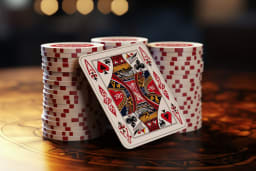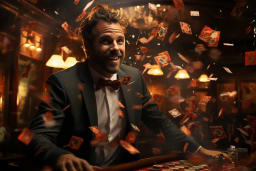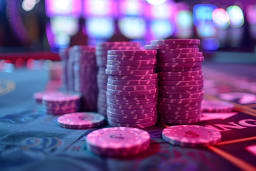Top Online Casinos in Canada 2026
Welcome to CasinoRank, your ultimate guide in the bustling world of online casinos! With over 20 years of expertise in the igaming industry, we are dedicated to providing you with reliable, up-to-date, and comprehensive information. Whether you're a seasoned gambler or just starting out, we cater to all levels of experience. Our detailed ratings and rankings help you choose only the best online casinos that meet our stringent criteria for safety, game variety, and user experience. Dive into our rich resource of casino games, bonuses, and payment methods, and let us guide you to your next favorite online casino!
Recommended Online Casino Toplist
How We Rank
We rank casinos based on different factors that are important to a good player experience. The main ones are the following:
How We Review
We carefully evaluate each casino to guarantee the best possible gaming experience for you. Our review process is based on several important factors:
- By Casino Reputation: We assess the casino’s reputation in the industry and among players to ensure reliability.
- By Safety and Trustworthiness: We verify the security measures and trustworthiness of the casino to protect your personal and financial information.
- By Bonus Offer Availability: We examine the variety and generosity of bonuses and promotions available to players.
- By Game Library Variety: We evaluate the diversity and quality of the game selection, including slots, table games, and live dealer options.
- By Payment Method Reliability: We check the reliability and efficiency of the available payment methods for deposits and withdrawals.
- By Global Reach and Local Adaptation: We consider the casino’s accessibility to players worldwide and its adaptation to local markets.
- By User Experience and Support Efficiency: We review the overall user experience, including website navigation, and the effectiveness of customer support.
- By Registration Process Speed: We analyze the ease and speed of the registration process to ensure a smooth start for players.
By assessing these key factors, we provide reliable reviews and expert advice.
How We Educate
At CasinoRank, our mission is to equip you with the knowledge needed to navigate the world of online gambling confidently. We provide comprehensive guides that are clear, concise, and designed to help both beginners and experienced players alike. Here's an in-depth overview of the different types of casino guides we provide:
Guides on Online Casino Games
Our detailed guides on online casino games provide in-depth information on game rules, strategies, and tips to improve your skills. Our expert insights aim to enhance your gameplay, boost your chances of winning, and ensure you can navigate the gaming world with confidence. Whether you’re a novice or an experienced player, our guides offer valuable information to help you master your favorite games.
Guides on Online Casino Bonuses
Bonuses are key to enhancing your online casino experience. Our comprehensive guides explain the different types of bonuses, along with their terms and conditions. We provide tips on how to avoid common pitfalls and make the most of these offers. Understanding the intricacies of casino bonuses can significantly boost your bankroll and overall enjoyment, ensuring you get the best value from your gaming sessions.




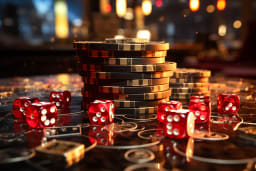

Guides on Payment Methods
Choosing the right payment method is crucial for a smooth gaming experience. We offer insights into various payment options, highlighting the fees, processing times, and security features of each method. By understanding the pros and cons of different payment methods, you can select the one that best suits your needs, ensuring fast and secure transactions.
Online Casino Guides for Beginners
If you're new to online casinos in Canada, our beginner guides are the perfect starting point. We cover everything from setting up an account to making your first deposit and understanding the basic strategies for different games. Our guides are designed to help you get familiar with the online casino environment, providing step-by-step instructions and practical tips to ensure a smooth and enjoyable experience. With our guidance, you'll quickly gain the confidence to explore and enjoy the wide range of games available.

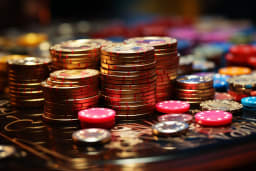






Online Casino Guides for Advanced Players in Canada
For seasoned players seeking to refine their strategies, our advanced guides offer deep insights, tips, and expert advice. We delve into advanced gameplay techniques, effective bankroll management strategies, and the latest industry trends and innovations. Our expert content helps you stay ahead of the curve, maximize your winnings, and enhance your overall gaming experience. Whether you’re looking to master a specific game or stay updated on the latest developments, our advanced guides provide the knowledge you need to succeed.
Who We Are
At CasinoRank, our greatest asset is our team of over a hundred multilingual professionals. We are proud to have a diverse group of experts, including authors, reviewers, fact-checkers, researchers, and many other specialists. Each member of our team brings unique skills and insights, ensuring we deliver the most accurate and comprehensive information on the best online casinos. With our collective expertise, we are committed to guiding you through the world of online gambling with confidence and ease.
Safety & Licensing
Safety and licensing are crucial aspects of the online gambling experience, ensuring that players can enjoy their favorite games without worrying about security or fairness.
Safety
At CasinoRank, your safety is our top priority. We understand how important it is to feel secure when engaging in online gambling. That's why we meticulously vet each casino on our site to ensure they adhere to the highest security standards. We look for advanced encryption technologies, like SSL encryption, robust firewalls, and secure payment methods. Our goal is to ensure that your personal and financial information remains confidential and protected from any potential threats. When you choose a casino from our list, you can play with peace of mind, knowing that your safety is well taken care of.
Third-Party Audits
To further guarantee the safety and fairness of the casinos we recommend, we place great emphasis on third-party audits. These independent audits are conducted by renowned organizations specializing in testing and certifying online casinos. They check for fairness in games, proper handling of user data, and overall operational transparency. Notable auditors include eCOGRA, iTech Labs, and GLI. By ensuring that our listed casinos pass these stringent audits, we confirm that they operate with integrity and provide a trustworthy gaming environment. Trusting a casino that undergoes regular third-party audits means you can enjoy a fair and unbiased gaming experience.
Licenses
Licensing is a critical factor in our evaluation process. We only feature casinos that hold valid licenses from reputable regulatory bodies. These licenses are a testament to the casino's commitment to maintaining high standards of fairness, security, and responsible gambling. Our reviewed casinos possess some of the best globally recognized licenses, including:
- Malta Gaming Authority (MGA): Known for its rigorous standards and thorough vetting process, the MGA license is a mark of trust and quality.
- UK Gambling Commission (UKGC): This license is highly respected and indicates a casino's compliance with strict regulations designed to protect players.
- Gibraltar Regulatory Authority (GRA): Casinos licensed by the GRA are known for their integrity and adherence to stringent regulations.
- Curacao eGaming: Although easier to obtain, a Curacao license still ensures that the casino meets certain standards of fairness and security.
- Alderney Gambling Control Commission (AGCC): This license is awarded to casinos that meet high standards of operation, ensuring player protection and game fairness.
- Kahnawake Gaming Commission: Known for its stringent regulatory framework, this license is a sign of a casino's commitment to ethical practices and player security.
- Isle of Man Gambling Supervision Commission: This regulatory body is known for its strict licensing requirements, focusing on player protection and responsible gambling.
- Swedish Gambling Authority (SGA): Casinos with this license adhere to Sweden's strict gambling laws, ensuring a safe and fair gaming environment.
- Danish Gambling Authority (DGA): This license indicates that a casino complies with Denmark's comprehensive regulations to protect players and ensure fair play.
These licenses guarantee that the casinos we feature operate under strict regulatory oversight, providing a secure and fair gaming environment for all players.
Gambling Laws
Navigating the world of online gambling laws can be complex, as they vary significantly from one region to another. We keep track of global gambling regulations and update our information regularly to reflect any changes. Below is an overview of the gambling laws in some of the largest gambling markets:
| Country | Gambling Law Description |
| United States | Gambling laws vary by state, with Nevada and New Jersey having the most liberal regulations. |
| United Kingdom | The Gambling Act 2005 regulates all forms of gambling, including online, overseen by the UK Gambling Commission. |
| Canada | Gambling is regulated by provinces, with online gambling being popular and growing. |
| Australia | The Interactive Gambling Act 2001 regulates online gambling, overseen by the Australian Communications and Media Authority (ACMA). |
| Germany | The Interstate Treaty on Gambling regulates all forms of gambling, with strict conditions for online gambling. |
| Italy | Gambling is regulated by the Autonomous Administration of State Monopolies (AAMS) under the Public Security Law 2011. |
| Spain | The Gambling Act 2011 governs all gambling activities, including online, overseen by the Directorate General for the Regulation of Gambling (DGOJ). |
| Sweden | The Gambling Act 2019 regulates the industry, overseen by the Swedish Gambling Authority (Spelinspektionen). |
| France | The Gambling Act 2010 regulates online and land-based gambling, overseen by the French Gambling Authority (ARJEL). |
| Denmark | The Danish Gambling Act 2012 regulates all forms of gambling, overseen by the Danish Gambling Authority (Spillemyndigheden). |
Latest news
FAQ
What is CasinoRank?
CasinoRank is a leading affiliate brand that provides reviews and rankings of various online casinos and betting platforms available to Canadian players. Our network of websites offers comprehensive information tailored to the Canadian gambling landscape. Our goal is to equip you with the knowledge to make informed choices.
Why trust CasinoRank?
With over 20 years of experience evaluating the online gambling scene, CasinoRank has established itself as a reliable source of information for Canadian players. Our team of experts conducts thorough research and provides unbiased reviews. We prioritize your safety, transparency, and overall satisfaction when making our recommendations.
What kinds of casinos does CasinoRank review?
CasinoRank reviews a wide spectrum of gambling sites catering to Canadian players, including online casinos, new casinos, mobile casinos, live dealer casinos, sportsbooks, esports betting platforms, slot sites, and even lottery platforms.
How does CasinoRank rate and rank casinos?
We evaluate casinos based on several key factors, including their reputation, safety measures, bonus offerings, game selection, payment method options, user experience, customer support quality, and registration speed. We also consider how well they cater to the Canadian market. This comprehensive approach ensures that our rankings highlight the best and most reliable online casinos for Canadian players.
How often are the rankings updated on CasinoRank?
Our rankings are regularly updated to reflect the dynamic nature of the online casino industry. This includes the launch of new casinos, changes to existing platforms, and updates to promotions and bonuses relevant to Canadian players.
Is it legal to gamble online through casinos listed on CasinoRank in Canada?
Yes, it is legal to gamble online through casinos listed on CasinoRank, provided online gambling is legal in your province. We only recommend casinos that hold valid licenses from reputable regulatory bodies and comply with all applicable Canadian laws to ensure a secure and legal gambling environment.
How can I contact CasinoRank for support or inquiries?
For any support requests, inquiries, feedback, or partnership opportunities, please reach out to us via the contact form on our website. Our dedicated team is committed to providing prompt and helpful assistance to address any questions or concerns you may have.
Is OnlineCasinoRank part of CasinoRank?
Yes, OnlineCasinoRank is an integral part of the CasinoRank network. It's one of our specialized platforms dedicated to delivering in-depth reviews and rankings of online casinos for players in Canada.


